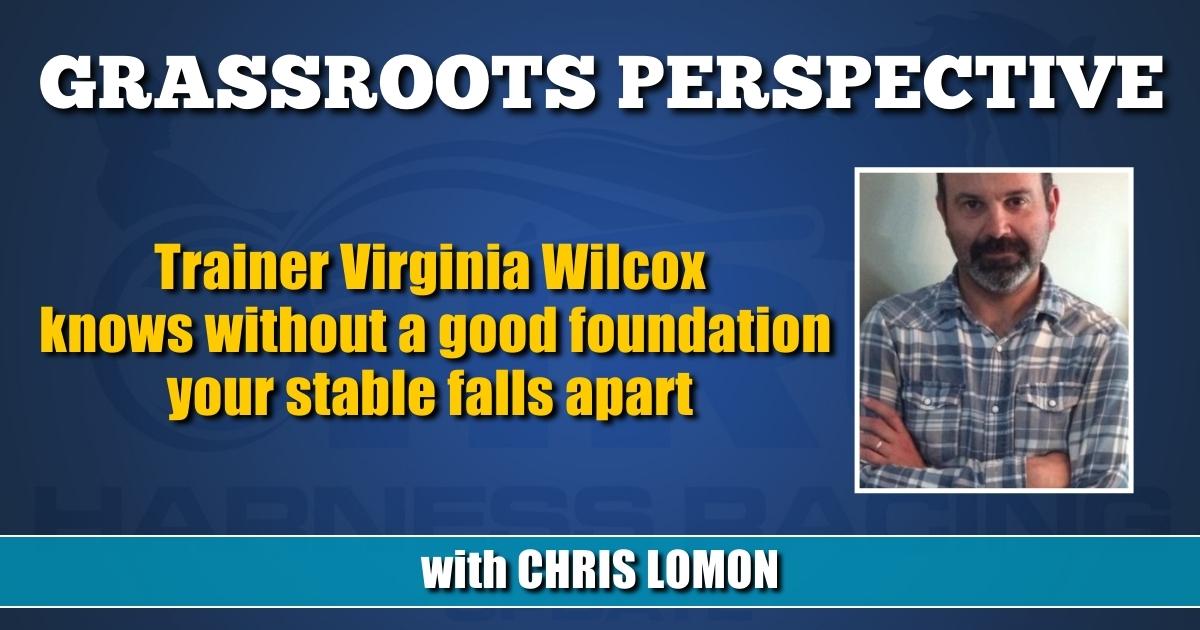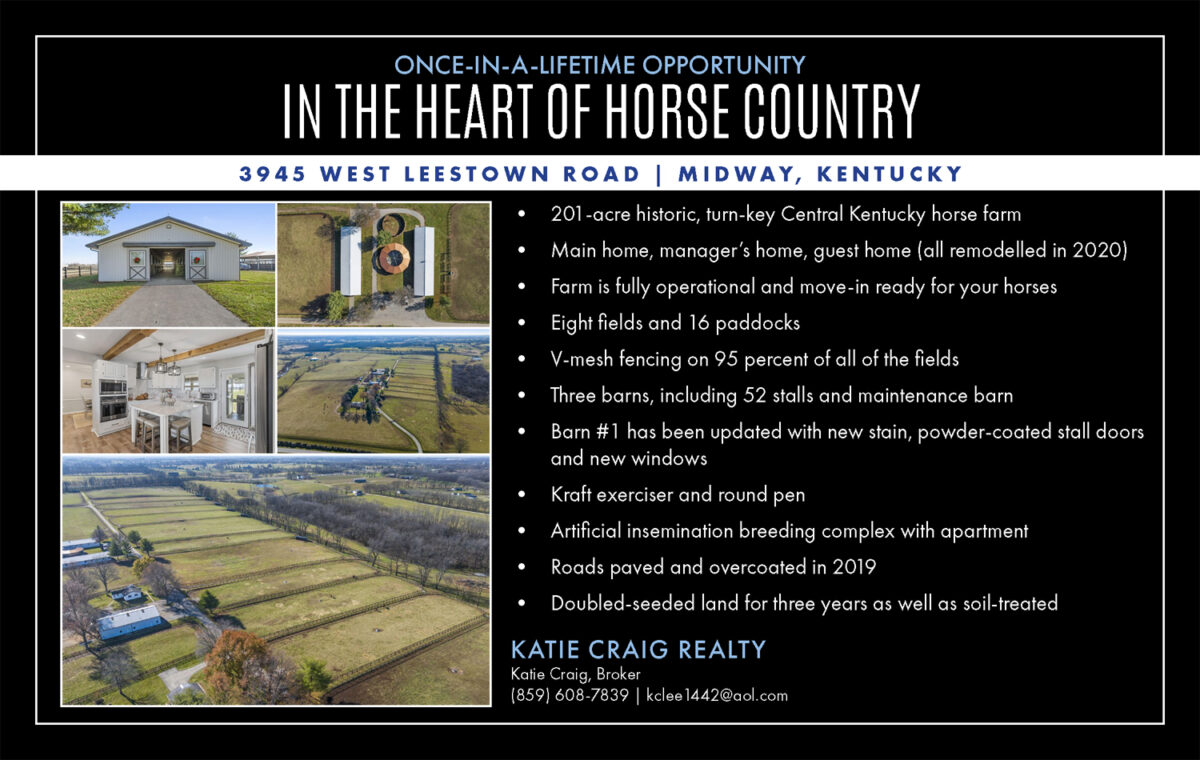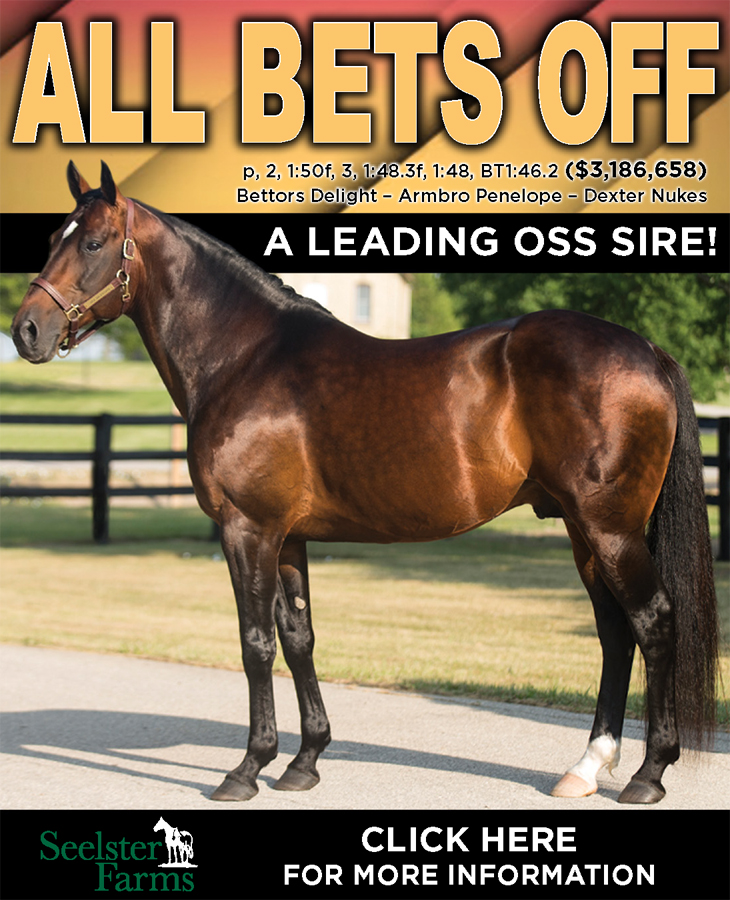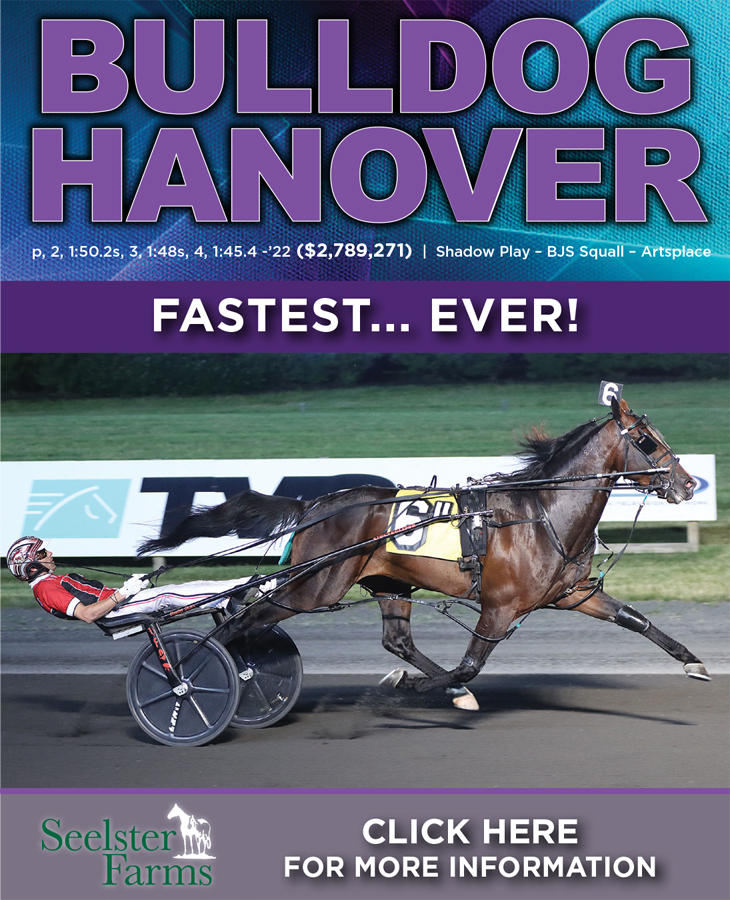

Trainer Virginia Wilcox knows without a good foundation your stable falls apart
by Chris Lomon
Virginia Wilcox’s connection with horses might be best described as farm to stable.
“We grew up on a dairy farm, but we always had horses,” said Wilcox, who was born and raised in the Buckeye State. “We rode and we showed. Our parents thought we would outgrow this, but no, the girls all stuck with horses. Around 1982 or 1984, somewhere around that time, I was working a third shift job at a factory, and when I would get off work in the morning, I would go and gallop thoroughbreds for a gentleman. When I finished that, I drove another 30 minutes back to work for [standardbred horse people] Richard and Betty McNutt. They had a really nice horse, Independent Blaze, and they had a small farm with a third of a mile track, I went there every day and helped them. That’s how I got into the standardbreds.”
The list of accomplished horse people she has worked with over the past 40 years is a long and impressive one.
Whatever barn she found herself in, Wilcox was meticulous in her observations, keen to pick up any useful knowledge from the trainers who plied their trade in the U.S. Midwest.
“I mostly worked as a groom, jogging and helping train,” she said. “When you do this line of work there are a lot of differences in people’s training styles. I’ve worked for Dee Hotten, Kurt Sugg, and Johnny D. Wengerd, and I’ve always learned something from everyone that I’ve been associated with. You take all the good things that you have learned and then blend them into your own approach, to find what works best for you and your horses.”
Wilcox, over time, discovered the key to success on the racetrack starts with the people behind the scenes in the barn, the unsung types who are guided, first and foremost, by a love for the animal.
“I’m an animal lover and I’m a big believer in horsemanship first,” Wilcox said. “I also believe that the most important people in this industry are the people in your barn. Grooms are your foundation. You can be a great trainer, but if you don’t have grooms that take care of the animals the way they need to be, the horses won’t succeed.”
She doesn’t need to look beyond her barn to appreciate the importance of that philosophy.
Wilcox, who took out her trainer’s license seven years ago, leads a busy horse life, not only racing her band of pacers and trotters but also tending to 20 standardbreds on her farm.
There are two key reasons, namely, Whitney and Danny Maynard, who ensure everything runs smoothly in her absence.
“They take care of their horses as if they were their own children,” Wilcox said. “We have our ideas on how to train a horse, and how to take care of them, and it’s almost identical. They are more pacing people, but they have been phenomenal with our trotter.”
That trotter, Reichers Caviar, is just one success story for Wilcox and Co.
A 4-year-old daughter of Triumphant Caviar—Reichers, the bay mare, bred and owned by Sweiger Stables LLC, of Perryville, OH, has been a welcome addition to the barn.
“We raised her as a yearling,” Wilcox said. “I sold her for less than I should have, and she went to [trainer] Chris Beaver. I knew that was a good match. He said she was the best-gaited Caviar he ever sat behind. She made just shy of $100,000 in her first year. She was second in the Next Generation and won the Ohio Breeders Championship. We bought her back at the end of her 3-year-old year and now she’s with us and she’s been amazing. We also have her dam and two half-sisters.”
And then there is American Blitz.
The trotting daughter of Keystone Blitz—American Breeze became one of Wilcox’s most beloved competitors, a bay mare who prompts both fond recollections and bittersweet memories.
In all, American Blitz would make 24 starts, which produced a 7-4-3 mark and $10,883 in earnings.
For Wilcox, it was never about money made or winner’s circle trips with the horse she affectionately called “Brat.”
Instead, it was the will and determination exhibited by the horse with the modest bank account and short racing career that first came to mind for Wilcox.
It was American Blitz who delivered her doting trainer with her first win.
“I love that little horse,” he said. “There is nothing like that winning feeling. It’s amazing. I went to the racetrack with Dee Hotten because she had a horse in the same race. She said, ‘Your filly is going to win.’ And I said, ‘No, she’s not.’ But she did. It was amazing. It was a thrill and a half.”
That emotional high was soon derailed.
“As a 2-year-old, after racing at our fair in Wayne County, she got very sick, deathly ill,” Wilcox said. “The vet got to our farm and said it appeared to be some type of toxin. He gave her a bag of fluids and said she will drink a lot of water, and that she will either bounce back or decline again. We spent almost every nickel she had earned on vet bills. We took her to the Ohio State Vet Clinic and were told it was something neurological. We got her down there and she was acting right as rain. We brought her back home, and the next day, she was sick again. We took her back down for three days and they had done a spinal tap, thinking it could be encephalitis. We never did figure out what was wrong with her. I wanted to test for West Nile and EPM, so we could rule those out. My instructions were to take her home, stall her for two days and then hand-walk her. They said she would be a pasture pet. I accepted that she was done as a racehorse.
“Two days later, she was tearing down her stall, which was why I called her Brat. I took her out to walk and she was dragging me everywhere. So, I started jogging her because if I didn’t do something, she was going to hurt herself. Two weeks later, we raced her. She won and went wire-to-wire. We got the results a couple of days later from the lab and they said she was negative for West Nile and EPM. We raced her as a 3- and 4-year-old and she had a few babies. She had gone into labor several months early in the field, but unfortunately, she and the foal passed away. She was so beloved. We buried her out there and she will be with me for the rest of my life. I learned a lot from her. She was special.”
As is every horse to Wilcox.
Rose Run Rae is another that comes to her mind.
The trotting miss went 7-16-9 from 65 starts and earned just shy of $65,000 for her career.
But it isn’t seven wins and a near 50 per cent in-the-money average that Wilcox shares a story about.
“The night I claimed her, she set a lifetime mark of 2:01,” Wilcox said. “Within a few months, we had dropped her mark to 1:56.4. She won two of the legs for a series at Northfield, but in the third, she had an equipment issue, and she broke stride. She had post 8 for the final and she won. I was over the moon. Kurt Sugg drove her. She got loose from me one night, in the snow, and took off running. When I called her, she turned around and came running back to me. That’s the bond I have with my horses and is the bond that I want.”
Wilcox has already forged a close connection with the newest member of her standardbred family.
Beyond Kronos, who finished his racing career this January, will now stand stud at Abby Stables in Sugarcreek, OH, about an hour’s drive southeast of Wilcox’s home in Perrysville.
“We went to New York and bought him,” she said. “He’s a Muscle Hill horse, who made nearly $250,000 in his career. I’m a pedigree nut. I love reading all of that and finding out things that can help you breed better horses. That, and my entire time with the horses, has been a thrill all along.”
As for the most rewarding part of her years in racing, Wilcox takes a brief pause to ponder her answer.
Her reply is by no means a surprise.
“I would say it’s being at the barn with my people and the horses,” Wilcox said. “I love the horses. They answer me, they talk to me… I truly love them.”















